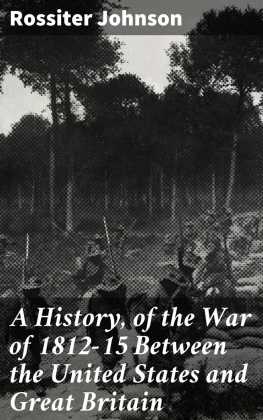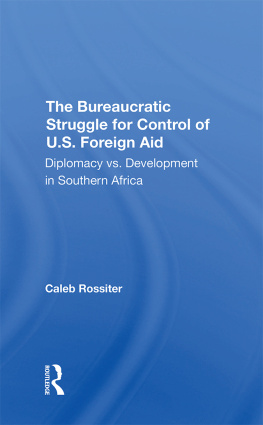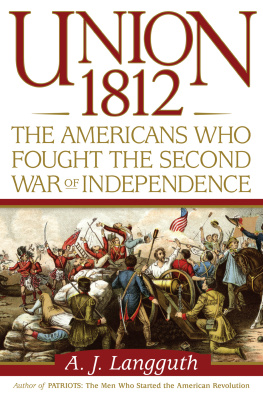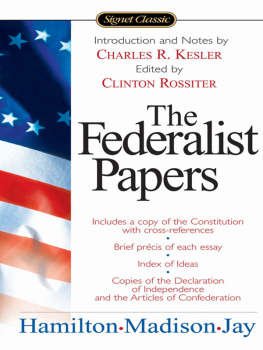CAUSES OF THE WAR.
FRANKLINS PREDICTIONBRITISH FEELING TOWARD the United StatesThe Unsurrendered PostsIndian TroublesImpressment of SeamenThe Decrees and Orders in CouncilDeclaration of War.
T he offender, says an Italian proverb, never forgives; and it is a singular fact that the deepest resentments and the most implacable hatreds are not those arising from a sense of injuries received, but from injuries inflicted. The victim of a deliberate wrong seldom treasures up a purpose of revenge, or demands anything more than a restoration of his rights; but the oppressor always hates those who have escaped from his oppression.
That wise old philosopher, Ben Franklin, who died within seven years after the acknowledgment of our country as a separate nation in 1783, foresaw, even then, what did not take place till more than twenty years after his death. He declared that the war which had just closed in the surrender of Cornwallis was only the war of Revolution, and that the war of Independence was yet to be fought. When, in June, 1785, George III. received John Adams as United States Minister at his court, he said: I was the last man in the kingdom, Sir, to consent to the independence of America; but, now it is granted, I shall be the last man in the world to sanction a violation of it. If the King was sincere in this declaration, he must have hadas Lincoln said of himself when Presidentvery little influence with the Administration; for, almost from the first, there was systematic disregard of the rights of the new nation, with an evident purpose to humiliate her people and cripple their commerce.
It was hard for the British Ministry and British commanders to realize that those whom they had so lately attempted to chastise as rebels, that they might again tax them as subjects, were now, after their triumph in a long war, and by the terms of a solemn treaty, entitled to the same privileges on the ocean, and the same courtesies in diplomacy, that were accorded to the oldest nation of Europe. They knew as little of the spirit of the American people and the mighty destinies within the coming century, as of the resources of the vast continent which lay behind that thin line of civilization along the Atlantic coast.
This failure to realize, or reluctance to admit, that the people of America were no longer British sub jects, and that the United States was an independent nation, was forcibly illustrated in Englands disregard, for thirty years, of an important portion of the Treaty of 1783. It was there stipulated that the military posts on our western frontier should be surrendered to our Government. Yet not only did the British forces retain possession of them, but from them they supplied the Indians with arms and ammunition, and instigated savage hostilities against the American settlements. Attempts have been made to deny this, but the proof is unquestionable.
Lord Dorchester, Governor of Canada, called a council of the Indian tribes, engaged to supply them with munitions of war, encouraged them to enmity against the United States, and gave them to understand that they would have the co-operation of his Government. These facts were published in British newspapers, and when the British Minister was asked to account for them, he could give no satisfactory answer. In pursuance of this policy, when war broke out, in 1812, the English commanders not only employed Indian allies, but offered and paid a regular bounty for American scalps. It seems incredible that such things could have been done, only seventy years ago, by one of the most enlightened governments on earth. And yet in our own day we have seen the performance repeated, when the English in South Africa armed the native savages with the best English rifles, that they might make war upon the peaceful and industrious Boers of the Transvaal Republic.
But our people had a grievance, of more than twenty years standing, which was even more serious than this. While the frontiersman was contending with British treachery and Indian ferocity, which combined to hinder the development of our inland resources, the American sailorthen the best in the world, as was proved by the result of the warwas confronted by a monstrous policy intended to check our growing commerce and recruit the English navy at our expense.
England was at this time the greatest commercial nation in the world. Her merchant ships and whalers were found on every sea, gathering and distributing the productions of every land. In herself she was but an island, not larger than one of our Statesa very beautiful and fertile island, it is true; but if her jurisdiction had not extended beyond its borders, she would have been hardly more important than Switzerland or Sweden. But in her colonies and her commerce she was powerful. And now the finest of those colonies, casting off her authority in the only successful rebellion ever waged against it, were rapidly building up a mercantile marine that threatened to rival her own. They had thousands of miles of seacoast, with innumerable fine harbors; they had behind them, not a crowded island, but a virgin continent; the construction of their government and society was such that the poorest man before the mast might not unreasonably hope some day to command a ship. With all this, they were not involved in the wars which were then distracting Europe.
Being neutrals, of course they enjoyed those advantages which England has never been slow to reap when she herself has been a neutral while her neighbors were at war. Their ships could carry goods which in any other ships would have been seized by hostile cruisers. England was nowas she truly said, in extenuation of her depredation on American commercestruggling for her very existence, against mighty armies led by the ablest general that had appeared since Alexander. Many of the most desirable ports were closed to her merchantmen, her entire coast was declared by Napoleon to be under blockade; and it was exasperating in the last degree to see these misfortunes redounding to the advantage of a people whom she had so lately treated as rebels and outlaws, whose military prowess she had affected to despise, until it had disarmed her legions and conquered an honorable peace. The motive that controlled British policy was plainly revealed in an editorial article which appeared in the London Independent Whig (January 10th, 1813), after the war had been begun and the British public had been astounded by the capture of two or three of their finest frigates. Accustomed, as we have hitherto been, to a long and uninterrupted tide of success upon the watery element, and claiming an absolute and exclusive sovereignty over the ocean, to be defeated there, where we securely rested our proudest hopes and wishes, might reasonably be expected to check our insolence and mortify our pride. In this view of the case, and if we could not flatter ourselves that it would have the effect of inducing us to abate somewhat of our unwarrantable pretensions, and listen to terms of moderation and forbearance, our regret would be sensibly diminished; since even the misfortune, severe as it is, might be converted into a great and lasting benefit to the nation at large. But the mischief will not confine itself here; the charm of the invincibility of the British navy, like that of the Grecian warrior, being destroyed, the terror that has long preceded our flag, and commanded the abject homage of surrounding nations, will henceforward be dissipated, and every maritime power with whom we may be involved in war will fight with redoubled zeal, ar dently and anxiously hoping to lower our ascendency and establish the freedom of the seas. That was it exactly; they were afraid somebody would establish the freedom of the seas, and at that time the Americans seemed most likely to do it.












